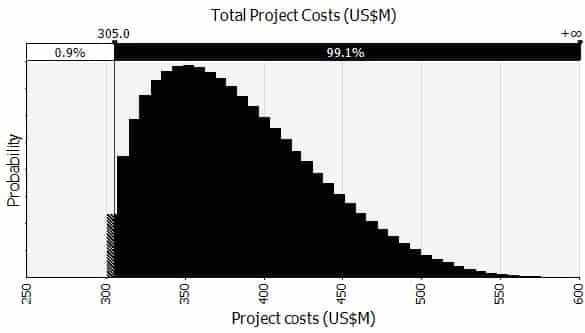
A large gas transmission and storage company had some large cost overruns of a number of project’s costs and schedules. They wondered if there were a better way to understanding and managing risks. EpiX proved to them the value of utilizing Monte Carlo risk analysis, and provided the knowledge and tools to use Monte Carlo in their project planning.
In business, in order to keep a competitive advantage, you need to be able to take steps to improve the way you do business. You also don’t want to become the victim of falling for every new theory or analytical methodology out there. An S&P 500 oil and gas company who had no experience with Monte Carlo risk analysis wanted to see if their project cost and schedule projections could be improved. They knew of Monte Carlo analysis but had never used it before and were very skeptical about it. They didn’t want to invest time and money into a process that would just turn out to be the next ‘newfangled’ thing. So, they proposed that EpiX Analytics perform a risk-based cost projection for a very large, high-value, high-investment pipeline project that spanned hundreds of miles across complex geographies that was near completion to see whether Monte Carlo simulation would have provided the company with better insight about the project and its risks. In other words, the company provided the EpiX team with no information as to the actual (confidential) final figures or outcome of the project and challenged EpiX to “predict” the potential of this project to successfully meet its budget. WHAT EPIX ANALYTICS DID EpiX Analytics met with the company’s engineers, cost estimators and project managers and spent time discussing the risks of the project, reviewing available data, and evaluating the estimates that the oil and gas company had used in creating the budget. EpiX also used numerous techniques to elicit expert opinion about the project’s risks, while minimizing different types of biases. EpiX then conducted a Monte Carlo risk analysis and predicted that there was about a one percent probability that the project would come in within the original budget. So, how did EpiX do? The project had indeed run over budget. The success and profitability of the entire project had relied on an optimistic evaluation without accurately taking into account various risks. In reality, there had been delays, cost overruns, outcomes of environmental and regulatory requirements, and even weather, that hadn’t been accounted for in their budget. Sure, the company knew what risks existed for the project and had done sensitivity analyses on their assumptions; they wouldn’t have become a Fortune 500 company if they hadn’t. But what they lacked was the know-how and tools to take so many risks and unknowns into account in a comprehensive, probability based analysis. After realizing how much better informed they could be in their planning and budgeting by using Monte Carlo analysis, they hired EpiX Analytics to help them set up a dedicated department that evaluates key risk factors for projects. EpiX provided training to the new department, built template cost and schedule models for projects that the group could use for future projects. Since that experiment was done many years ago, EpiX has continued to work with the company to add functionality to their models and provide ongoing training.

As a result of the work done by EpiX, the company can now better predict the true costs and economics of each of the projects that they are pursuing making their business smarter and faster. Our client has seen such an improvement in their decision making through the use of Monte Carlo risk analysis that they created a group within the company that is dedicated to performing risk analyses for their projects. And, we know that it’s working for them because they continue to return for us to improve and add functionality to their models such as using Monte Carlo to assess the risks of their project schedules as well as evaluating the financial returns of projects. With EpiX’s help, they brought their understanding of projects and their risks to a new level of sophistication.



If you are looking to ground an important decision in robust analysis and evidence, let’s start the conversation.